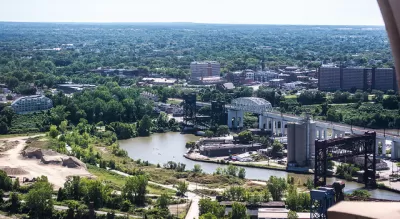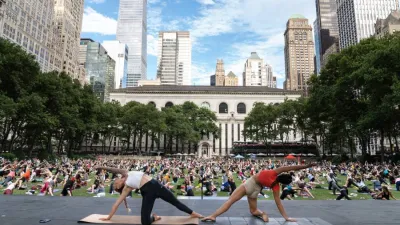The question of how the pandemic and all of its corresponding crises will alter the future of cities and planning has persisted since March. This article rightfully focuses those large, challenging questions of the Legacy Cities of the United States.

Jason Segedy writes about the future of Legacy Cities in the Post-Covid world, generating ideas based on information gathered during 15 hours of interviews with practitioners working on-the-ground in municipal government and community development in ten cities located in the Great Lakes region.
"There has been a lot of speculation about what the events of the past six months will mean for American cities in the future," writes Segedy to introduce the article. "Although most of the legacy cities of the Great Lakes region have been spared some of the most dramatic social and economic disruptions that have roiled their bigger coastal counterparts, their future, too, is unclear, particularly in the longer-term."
From the interviews, Segedy identifies three themes and eschews the notion of a one-size-fits all answer to the question of what will happen to Legacy Cities as a result of the pandemic. The themes, with a lot more detail provided in the source article, read as follows: 1) moving beyond the "eds and meds" economy, 2) the enduring importance of place, and 3) the advantages and disadvantages of smaller scale.
For an example of the kind of analysis that Segedy provides for each of these themes, the article includes a discussion of the pre-existing concerns about the "eds and meds" economic development model (as also documented in Alan Mallach's book The Divided City), before noting the struggles that both universities and healthcare institutions have encountered during the pandemic, and the likelihood that both sectors will face significant disruption over the next decade.
FULL STORY: Legacy Cities in a Post-COVID World: View From Experts in the Field

Planetizen Federal Action Tracker
A weekly monitor of how Trump’s orders and actions are impacting planners and planning in America.

Map: Where Senate Republicans Want to Sell Your Public Lands
For public land advocates, the Senate Republicans’ proposal to sell millions of acres of public land in the West is “the biggest fight of their careers.”

Restaurant Patios Were a Pandemic Win — Why Were They so Hard to Keep?
Social distancing requirements and changes in travel patterns prompted cities to pilot new uses for street and sidewalk space. Then it got complicated.

Platform Pilsner: Vancouver Transit Agency Releases... a Beer?
TransLink will receive a portion of every sale of the four-pack.

Toronto Weighs Cheaper Transit, Parking Hikes for Major Events
Special event rates would take effect during large festivals, sports games and concerts to ‘discourage driving, manage congestion and free up space for transit.”

Berlin to Consider Car-Free Zone Larger Than Manhattan
The area bound by the 22-mile Ringbahn would still allow 12 uses of a private automobile per year per person, and several other exemptions.
Urban Design for Planners 1: Software Tools
This six-course series explores essential urban design concepts using open source software and equips planners with the tools they need to participate fully in the urban design process.
Planning for Universal Design
Learn the tools for implementing Universal Design in planning regulations.
Heyer Gruel & Associates PA
JM Goldson LLC
Custer County Colorado
City of Camden Redevelopment Agency
City of Astoria
Transportation Research & Education Center (TREC) at Portland State University
Camden Redevelopment Agency
City of Claremont
Municipality of Princeton (NJ)





























